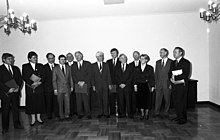Hans Joachim Meyer
[5] He grew up in an area that after 1945 was part of the Soviet occupation zone which became the German Democratic Republic (East Germany) in October 1949.
He studied law[5] at the Deutsche Akademie für Staats- und Rechtswissenschaft der DDR [de] in Potsdam between 1955 and 1958 but was excluded after six terms[5][4] before he could complete his degree because he "failed to connect with the working class" (wegen "mangelnder Verbindung zur Arbeiterklasse").
His dissertation was, again, resolutely non-political: it comprised a semantic analysis of the modern English verb prefix "Up" when compared to related prefixes in English and German ("Semantische Analyse der modernenglischen Verbalpartikel "up" im Vergleich zu verwandten englischen und deutschen Verbalpartikeln").
Shortly after, Meyer received and accepted an invitation to join the new government headed up by Lothar de Maizière, despite not being a member of any political party, and despite not having stood for election to the Volkskammer national parliament.
[2] Between 12 April and 3 October 1990, Meyer served as the German Democratic Republic's last Minister for Education and the Arts.
[8][11] His responsibilities included participation as leader of the East German delegation at the Gemeinsame Bildungskommission [de] between May and September 1990.
The commission's output was summarized in the Reunification Treaty (Articles 37 & 38) which came into force in October 1990 and was then implemented both at government level and on the ground.
